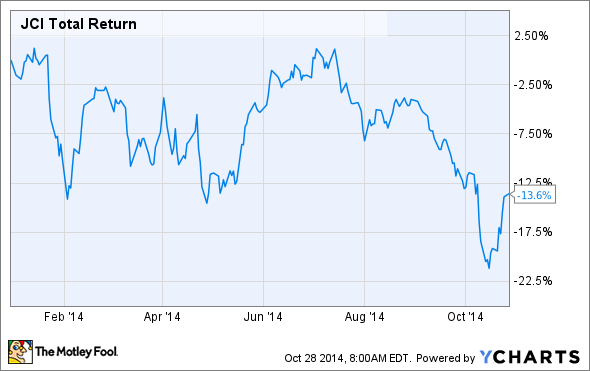Johnson Controls (JCI +1.64%) is doing everything it can to reward shareholders for hanging on through a bumpy ride over the past year. The stock is down roughly 13% year to date, including dividends. A year ago, Johnson Controls approved an additional $3 billion share repurchase authorization, bringing the total authorization to $3.65 billion. While repurchases could be a catalyst to drive the stock higher, Johnson Controls may be forgoing lucrative business opportunities as a result of its buybacks. Let's take a closer look at the repurchase plan to see if Johnson Controls is working in shareholders' interest.
Johnson Controls data by YCharts
A rare buyback plan
Johnson Controls does not have a long history of share repurchases, so the recent buybacks are a change of course for the company. In fact, the company did not repurchase a meaningful number of shares any time in the last decade until 2013. Instead, the company preferred to pay a stable dividend and reinvest cash flow in its business and to make acquisitions. The change in direction could be an indication that fewer opportunities to reinvest cash are available.

Data source: Morningstar
On the other hand, it could be a ploy by management to keep the company's stock price up. The stock had been on a tear in 2013, up 63% on the year. Since the market often takes repurchases as an expression of confidence in a company's prospects, management may have figured that share repurchases could only help the stock.
In any case, the repurchases will help boost earnings per share in the coming years. The company plans to spread out the $3.65 billion in repurchases across three years: fiscal 2014 through fiscal 2016. If all of the repurchases are made at the stock's current market capitalization -- $29.1 billion -- then Johnson Controls will have repurchased 12.5% of outstanding shares over three years. That will allow the company to mop up shares issued in past acquisitions and boost earnings per share.
A better way?
Despite their ability to boost earnings per share, repurchases are not always the best use of capital and Johnson Controls might be better off spending the money elsewhere.
Johnson Controls' automotive business (51% of revenue) is highly cyclical as it rises and falls with the automotive industry. As a result, Johnson Controls has made significant investments in its Building Efficiency and Power Solutions segments to diversify and provide stability.
Johnson Controls will strain its finances to afford $1 billion+ repurchases each year. The company generated $2.7 billion in cash from operations in 2013, far higher than in the prior two years. It also spent $1.4 billion in capital expenditures and $500 million in dividends, leaving $800 million available for stock repurchases. With only $160 million in cash on its balance sheet, the company must raise debt or reduce capital spending to finance its repurchase plan, unless cash flow increases significantly.
The automotive business is at a cyclical high. Johnson Control's automotive segment lost over $500 million in 2009; it has since rebounded to earn nearly $1.3 billion in 2013. The inevitable bust will eventually follow the current boom, lowering cash flows, and possibly making Johnson Controls regret not using its cash flow to further diversify its operations.
Assume the common sense response
Of course, management has a high degree of flexibility when implementing its plans. Although the company intends to use its full authorization by the end of fiscal 2016, that plan could change if the business deteriorates before then. If the company starts bleeding cash flow, the share repurchase will probably stop.
However, stopping the repurchase program due to deteriorating cash flows would leave the company unable to purchase shares if they drop in price. Although this is not an ideal scenario for buy-and-hold investors, shareholders who believe the shares are worth owning at the current price should be satisfied with the company's repurchases as long as the capital is not needed elsewhere. Bullish shareholders should cheer on the company's decision to continue share repurchases.





